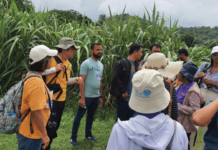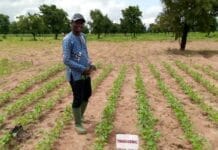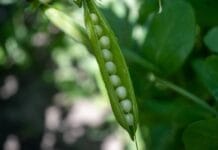AS wheat farmers in Bangladesh struggle to recover from a 2016 outbreak of a mysterious disease called “wheat blast,” the country’s National Seed Board (NSB) released a new, high-yielding, blast-resistant wheat variety, according to a communication from the Wheat Research Centre (WRC) in Bangladesh.
Called “BARI Gom 33,” the variety was developed by WRC using a breeding line from the International Maize and Wheat Improvement Center (CIMMYT), a Mexico-based organisation that has collaborated with Bangladeshi research organisations for decades, according to Naresh C. Deb Barma, Director of WRC, who said the variety had passed extensive field and laboratory testing. “Gom” means “wheat grain” in Bangla, the Bengali language used in Bangladesh.
“This represents an incredibly rapid response to blast, which struck in a surprise outbreak on 15,000 hectares of wheat in southwestern Bangladesh just last year, devastating the crop and greatly affecting farmers’ food security and livelihoods, not to mention their confidence in sowing wheat,” Barma said.
Caused by the fungus Magnaporthe oryzae pathotype triticum, wheat blast was first identified in Brazil in 1985 and has constrained wheat farming in South America for decades.
Little is known about the genetics or interactions of the fungus with wheat or other hosts. Few resistant varieties have been released in Brazil, Bolivia and Paraguay, the countries most affected by wheat blast.
The Bangladesh outbreak was its first appearance in South Asia, a region where rice-wheat cropping rotations cover 13 million hectares and over a billion inhabitants eat wheat as the main staple.
Many blast fungal strains are impervious to fungicides, according to Pawan Singh, a CIMMYT wheat pathologist. “The Bangladesh variant is still sensitive to fungicides, but this may not last forever, so we’re rushing to develop and spread new, blast-resistant wheat varieties for South Asia,” Singh explained.
The urgent global response to blast received a big boost in June from the Australian Centre for International Agricultural Research (ACIAR), which funded an initial four-year research project to breed blast resistant wheat varieties and the Indian Council of Agricultural Research (ICAR), which also provided a grant to kick-start the work in South Asia. Led by CIMMYT, the initiative involves researchers from nearly a dozen institutions worldwide.
Chemical controls are costly and potentially harmful to human and environmental health, so protecting crops like wheat with inherent resistance is the smart alternative, but resistance must be genetically complex, combining several genes, to withstand new mutations of the pathogen over time.
Key partners in the new project are the agricultural research organizations of Bangladesh, including the Bangladesh Agricultural Research Institute (BARI), and the Instituto Nacional de Innovación Agropecuaria y Forestal in Bolivia, which will assist with large-scale field experiments to select wheat lines under artificial and natural infections of wheat blast.













